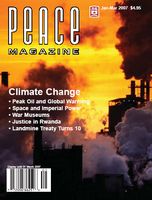
Peace Magazine Jan-Mar 2007, page 5. Some rights reserved.
Search for other articles by various here
We concur with John Bacher's review [in Peace, October 2006] of Michael Ignatieff's book, Empire Lite. Ignatieff characterizes himself as a "liberal internationalist," but his writings reveal a major split between his theory and practice.
Ignatieff cuts a liberal figure when writing that force is only legitimate as an "absolute last resort" and where it has "proper authority." But he often ignores this liberal position in practice. He advocated military offensives that were not UN-authorized: the 1999 NATO bombing of Serbia (including civilian facilities), the 2003 US invasion of Iraq, and Canada's 2006 military operations in Kandahar. These examples show that he readily adopts force as an early resort.
Ignatieff dismisses soft power efforts such as international police work, as having "no deterrent effect." He seems to ignore the concrete results: bringing to justice the perpetrators of the 1993 World Trade Center bombing and the 1998 US embassy bombings, and foiling recent plots in Toronto and London.
Ignatieff's willingness to apply military force is not surprising given his black and white view of the "war on terror." He has labeled America's enemies as "evil" and describes terrorism as an "apocalyptic nihilism." He argues that a war against terrorism will necessarily be a "dirty war," requiring us to "traffic in evils." He justified the indefinite detention of suspects, coercive interrogations, and pre-emptive war.
Ignatieff holds that "failed and failing states" are today's most pressing international problems. His solution is an "empire lite": the use of American power to create democratic institutions and to speed development in "barbarian zones."
Ignatieff admits that "American power [is] used for imperial reasons: to consolidate its global hegemony, to assert and maintain its leadership." He described the 2003 Iraq war as "the work of conservative radicals ...[who aimed to] rebuild the pillars of American influence in the Middle East" -- but he kept their company nevertheless. He supported the Bush administration in the lead-up to the war, arguing that "motives are not discredited just because they are shown to be mixed." He touted the shaky US evidence on Iraq's weapons of mass destruction, ruminated about Saddam Hussein's potential to supply such weapons to a "terrorist internationale," and castigated UN inspections as ineffective. Thus, he declared, invasion was a "last resort." But after the invasion he changed his tune, arguing that the issue was not what weapons Hussein possessed, but his "motivations" and that "he was certain, sooner or later, to match intentions with capabilities." He wrote that, while the case for preventive war may not have been decisive, it was "the only real chance" of overthrowing an odious regime. This was certainly not a war of last resort.
Ignatieff dismisses any role for peacekeeping in his solution to the "crisis in state order." He advocates a "paradigm shift" from peacekeeping to enforcement. He argues that in failed and failing states "there is no peace to keep," making peacekeeping "so flawed that it must be abandoned altogether." He even recommended that the UN Secretariat should "stop running peacekeeping operations." But in reality UN peacekeeping has surged (almost 100,000 peacekeepers are currently under the UN flag) with the European-led UN deployment in Lebanon. Because of Ottawa's current commitment to war-fighting in Kandahar, which Ignatieff strongly supports, he argues that there is no capacity to deploy any Canadian soldiers to the UN's Lebanon operation. With this approach, Canada may become a single mission military, with Afghanistan as the sole major theatre of operation.
To support a "paradigm shift" from peacekeeping to "robust combat operations," he stresses the country's "great military tradition" and its "seriousness" in international affairs. Dismissing Canada's peacekeeping tradition, he cites the current Afghanistan mission as a "perfect demonstration" of the paradigm shift away from peacekeeping.But Afghanistan is showing the limitations of the offensive combat approach, which requires expensive military forces that create new enemies and sap the potential for other operations, including those of the United Nations in Darfur, the Congo, and Haiti.
A foreign policy under Ignatieff's stewardship would likely mean a Canada more engaged with the world's pressing issues. But the engagement would not follow in the footsteps of Pearson. Ignatieff may be a liberal internationalist in theory but he is better characterized as a conservative hawk in practice.
Walter Dorn and
Mike Varey
Toronto

Peace Magazine Jan-Mar 2007, page 5. Some rights reserved.
Search for other articles by various here